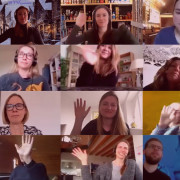- Science News
- Featured news
- 2021 – Open Science Is Saving Lives
2021 – Open Science Is Saving Lives
Kamila Markram, CEO and Co-founder

A year ago, I wrote about the strength of the human spirit that saw all of us come together as we rose before the challenge in front of us. Twelve months on, while COVID-19 remains a significant challenge to us all, more than eight billion vaccine doses have been administered to people around the world. 55% of the world’s total population have now received at least one dose of a vaccine.
What we have achieved in response to the pandemic is phenomenal. We are not there yet but scientists have risen to the challenge and provided treatments and vaccines at a speed faster than any other time in human history. Fundamentally this achievement was made only possible because research results around the coronavirus were shared openly and immediately. This success of science is really a success of science made open.
When most people still weren't aware of COVID in January 2020, Chinese scientists had already openly shared the genetic sequence of coronavirus, instantly triggering a race for vaccines worldwide. Two months later, in March 2020, when it was clear this was a global emergency, the US White House, together with a coalition of partner organizations, launched the COVID-19 Open Research Dataset (CORD-19). This collated all coronavirus-related research and mandated it must be open and free to access, even those articles published in subscription journals. At the time, there were 30’000 coronavirus research articles. Today, there are well over 400’000 – most open access.
Opening access to research papers, results, and data accelerated innovation and delivered coronavirus vaccines and treatments at a speed never seen before – and this saved millions of lives. A lack of access to scientific research, the majority of which is publicly funded, slows down scientific discovery and solutions to global challenges. And make no mistake, bigger challenges lie ahead - while research in other areas critical to our future remains locked: climate change, diseases, sustainability, cyber security and many others. What has been attained for COVID has not been achieved for other diseases and global emergencies. This year, the policy decision of the White House to open up COVID research was the absolute right call. Now, we must replicate that decisiveness across other areas.
Annually, cancer kills 10 million people; only 28% of research published between 2015 and 2019 is openly accessible. Cardiovascular disease is even worse: it kills 18 million people a year, but only 17% of research can be freely accessed. Figures for climate research show that of the approximately 160K papers published between 2015 and 2019, just 29% were accessible to researchers, industry, and members of the public. The climate emergency is the defining challenge of our generation. It determines the fate of all life on this planet. Just like for COVID, science has the solutions for the climate emergency, but it’s only open science that will deliver these solutions fast enough to prevent the worst outcomes of global warming. 2022 must be the year policymakers learn from COVID and from the success of open access. Some of the challenges we face will have irreversible consequences if we don’t act now.
Frontiers stands for open science; that means free, immediate, and unrestricted access to all publicly funded research for innovators, doctors, the media, you, me, people everywhere.
This year, we are proud to have reached several milestones thanks to the hard work and dedication of our editorial board members, our staff, and the broader open access community. We are now the third most cited publisher and have published more than 270,000 papers that are freely informing vital research worldwide. We have more than 1,200 employees across Europe, North America, and Asia and around 170,000 researchers now serve on the Frontiers’ editorial boards, as Chief, Associate and Review Editors. And even though more than 1.5 billion people have viewed or downloaded our research articles openly and freely, our work is not finished and will not be finished until all research is open access.
Open science is the reason that more people will be able to spend time with their loved ones this holiday: open science is the reason more people might enjoy happier, safer, more prosperous lives throughout the year ahead.
A heartfelt thank you to our entire editorial community – authors, editors, reviewers – for everything you have achieved and contributed. Your ongoing commitment to open science is saving lives, and it is an honor to work beside you and the Frontons, our teams. We have achieved a lot together, but we are not going to rest on our laurels and will be aiming even higher in the coming years.
From everyone at Frontiers and from my family to yours, we wish you a happy, healthy, and harmonious 2022.
Warm regards,
Kamila







